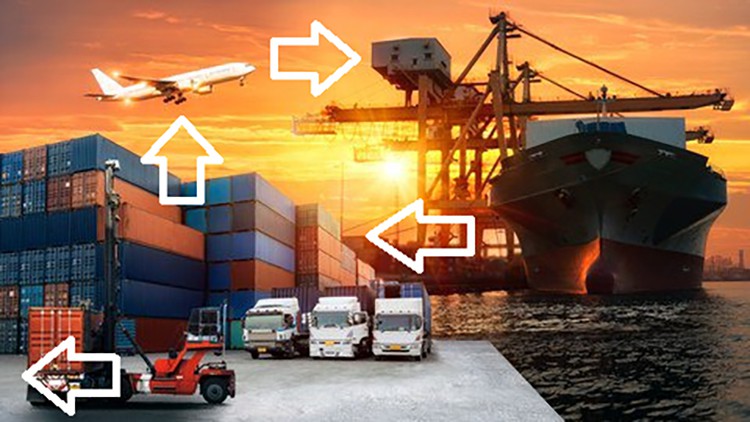International Shipping and Transport – Logistics Management
Transporting Freight/Inventory by Air, Sea, or Land: Logistics Supply Chain Management Fundamentals
What you’ll learn
International Shipping and Transport – Logistics Management
- How to Import/Export Your First Cargo (By Land, Sea, and Air)(Air, Land, and Sea).
- a description of the whole process and a timetable for sending overseas freight.
- Is it better to ship LCL or FCL?
- Incoterms (FOB, EXW, DDP, and other important international jargon) are required to understand your quotation and obligations.
- Tips for Clearing Customs
- Calculating volumetric and chargeable weight
- Transport and logistics are crucial elements of supply chain management.
- It’s important to get your cargo ready if you want to avoid taxes and delays and make sure the delivery goes smoothly.
- Calculate the value of the time saved before choosing whether to ship by air or by sea.
- Working with and Choosing Freight Forwarders and 3PL
- Add all anticipated and conceivable expenses associated with shipping goods internationally to your margin to determine your margin.
- What are the necessary documents, and why are they important?
Requirements
- Both previous knowledge and experience are not necessary.
- only a desire to develop personally and optimize your company’s logistics.
Description
Do you really think you’ll develop into a person who can confidently begin arranging your freight cargo shipment or who will assume a leadership position in commercial activities like freight handling or import/export? We both agree on this.
When you have to start from scratch, it can seem terrifying. Making your first cargo might be a very intimidating notion. Global logistics is a crucial component of millions of enterprises, both large and small. There are several obligations, dangers, errors, and traps. There are several alternatives. You are here because of it. The foundations of international commerce and logistics management are covered in our course. You can rely on us to provide you with sound advice on what to do, how to prepare, how to negotiate, and how to succeed.
What will you receive after the course?
- When you’re done with the course, you’ll know not only the basic ideas of logistics and the key terms, but also how to make a freight cargo. You will be ready for your first international or local freight/cargo voyage after taking this course.
- Your industry expertise may be improved by taking this course, which includes all the stages and timetables for sending international freight.
- We’ll talk about freight forwarders and third-party logistics suppliers.
- This course is also intended to expose you to significant enterprises and their associated paperwork, taxes, deadlines, and expenses. After our course, paperwork won’t be an issue.
- You’ll understand how the system operates. Whatever you produce, whether it be via manufacturing, services, retail, wholesale, import/export, or arbitrage, is irrelevant. Everything is perfect for our course.
- You’ll be aware of the most common beginner errors to avoid in your industry.
- The training will explain how to interpret all quotations from transportation providers’ actual, volumetric, and charged weights.
- We will jointly plan for the margin and any associated expenditures.
- As a result, your team will appreciate you more.
Become the team’s go-to expert on freight transportation; make the cargo stress-free. Work while being aware that everything is in order!
Course Divisions
1. Definition of International Transportation Logistics
How does it function? Why does it have prestige?
2. Industry knowledge and experience (all information on international transportation and export).
3. Resources (truck types, shipment planning, container and pallet selection, which option is best for your company, and so on)
4. Paperwork and documentation (everything and even more about documents, nuances, preparation, mistakes)
5. Freight forwarders and third-party logistics providers (what they do and how to work with them).
Pricing. (margins, calculations, templates, and examples)
regardless of where you work. For distribution, retail, logistics, manufacturing, and other purposes, it may be imported and exported. Our training is accessible to everyone and will provide you with a comprehensive set of international logistics principles. Let’s take charge of your transportation and logistics! This will let you have a significant say in how well your company does! Our expertise is now available for use in your business. Make your first shipment with me!
Let’s meet up on the course!
Who this course is for:
- Employees with ambition in Logistics, Supply Chain Management, Sourcing, Transportation, Customs, and Warehouse Management
- New Importers and Exporters is a good book for people who want to learn more about how supply chain managers run their businesses.
- Entrepreneurs in e-commerce, Amazon FBA, and drop shippers
- Owners of small businesses
- A hippo and people are being relocated inside a cargo container.
International Shipping and Transport – Logistics Management
Arduino Rotating LED Display That Prints Text on Air POV
Get Course Now









